

Cover Story: Economics of AI have Shifted Dramatically in Favour of Business. MGI Notes from the AI frontier Modeling the impact of AI on the world economy September 2018. Artificial Intelligence in Business Gets Real. Pioneers Are Eager to Scale AI Throughout Their Enterprise NN Group’s Knibbe is one CEO directing his personal attention to his organization’s AI agenda.
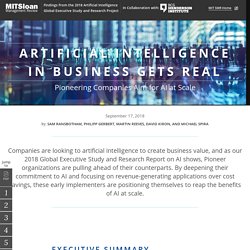
Even in a situation that would distract most CEOs — managing a recent major acquisition (of Delta Lloyd Group, previously one of NN’s main competitors) — he stays on top of AI developments. “You don’t have the capacity during such a large-scale integration to bet on a lot of things,” he says. But as one of his “big bets” for the combined entity’s future, AI remains a personal focus of his. Long before AI technology found its way into much practical business use, Knibbe was confident that it would prove valuable: “It is, for us, very clear that there should be a lot of benefits, given where the math and the science already is. AI and Robots in the Workplace. McKinsey&Company-The Shortlist dated 2018 09 14. Investing in AI will require patience and long-term strategic planning: McKinsey.
Modeling the global economic impact of AI. Artificial intelligence has large potential to contribute to global economic activity.
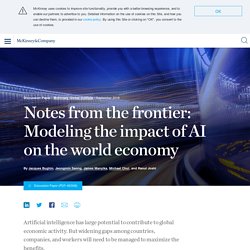
But widening gaps among countries, companies, and workers will need to be managed to maximize the benefits. The role of artificial intelligence (AI) tools and techniques in business and the global economy is a hot topic. This is not surprising given that AI might usher in radical—arguably unprecedented—changes in the way people live and work. The AI revolution is not in its infancy, but most of its economic impact is yet to come. New research from the McKinsey Global Institute attempts to simulate the impact of AI on the world economy. The analysis should be seen as a guide to the potential economic impact of AI based on the best knowledge available at this stage.
Gartner Hype Cycle: AI will be everywhere in 10 years. The Problem With AI Pilots. AI technology is not just an experiment.
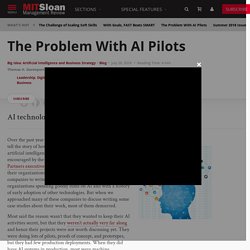
Over the past year or so we’ve been engaged in an effort to tell the story of how large organizations are deploying artificial intelligence in their businesses. We were encouraged by the response to the 2018 NewVantage Partners executive survey, in which 93% of respondents said their organizations were investing in AI initiatives. Plenty of companies to write about, we thought. 3 Steps to Building Trust in AI. The Future of Artificial Intelligence Depends on Trust. Artifical intellligence: Why a digital base is critical. Early AI adopters are starting to shift industry profit pools.
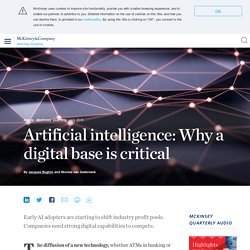
Companies need strong digital capabilities to compete. The diffusion of a new technology, whether ATMs in banking or radio-frequency identification tags in retailing, typically traces an S-curve. Early on, a few power users bet heavily on the innovation. Then, over time, as more companies rush to embrace the technology and capture the potential gains, the market opportunities for nonadopters dwindle. The cycle draws to a close with slow movers suffering damage. Most of AI’s Business Uses Will Be in Two Areas.
Global Competition of AI in Business: How China Differs. China’s momentum and challenges in artificial intelligence investments yield telling lessons for its worldwide observers.
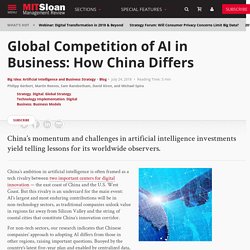
China’s ambition in artificial intelligence is often framed as a tech rivalry between two important centers for digital innovation — the east coast of China and the U.S. West Coast. Crossing the frontier: How to apply AI for impact. Altimeter - AI in the Enterprise. By Susan Etlinger, Industry Analyst, Altimeter For enterprise companies considering investing in AI and implementing AI applications, the current landscape can seem overwhelming.
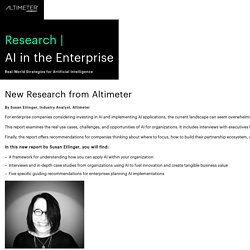
Companies like Amazon, Facebook, Google, Apple, and Microsoft dominate the news, but how applicable are their strategies to companies with vastly different business models? This report examines the real use cases, challenges, and opportunities of AI for organizations. It includes interviews with executives from large, well-known companies and start-up entrepreneurs who are envisioning the many ways that machine intelligence can fuel innovation and growth. AI and Machine Learning Will Change Our Business Future. The Big Leap Toward AI at Scale. The second step—understanding the evolution of value pools—is equally important.
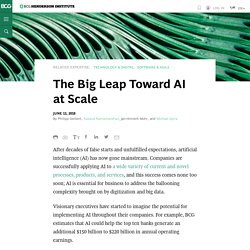
The rest of the world is not standing still, passively watching these rewards being realized. Other companies both within and outside a company’s traditional industry are focusing on how AI can help them attack value pools. In a prior publication, we illustrated potential value shifts in the health care industry among biopharma companies, insurers, providers, medtech companies, new entrants from the technology industry, and consumers. (See Putting Artificial Intelligence to Work, BCG report, September 2017.)
A foreshadowing of such shifts occurred in January 2018 when the stocks of major retail pharmacy chains and insurers dropped by up to 5% relative to the S&P 500 after Amazon, JPMorgan Chase, and Berkshire Hathaway announced their entry into health care. L’intelligence artificielle est-elle la solution à l’évolution des RH? How AI/Automation Will Affect The Workplace In The Future. AI, automation, and the future of work: Ten things to solve for (Tech4Good) As machines increasingly complement human labor in the workplace, we will all need to adjust to reap the benefits.
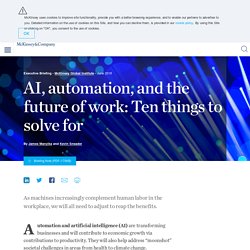
Automation and artificial intelligence (AI) are transforming businesses and will contribute to economic growth via contributions to productivity. They will also help address “moonshot” societal challenges in areas from health to climate change. At the same time, these technologies will transform the nature of work and the workplace itself.
Machines will be able to carry out more of the tasks done by humans, complement the work that humans do, and even perform some tasks that go beyond what humans can do. As a result, some occupations will decline, others will grow, and many more will change. Altimeter - AI in the Enterprise. By Susan Etlinger, Industry Analyst, Altimeter For enterprise companies considering investing in AI and implementing AI applications, the current landscape can seem overwhelming.
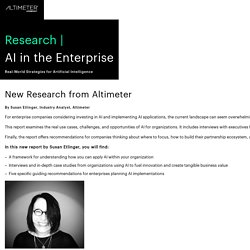
Companies like Amazon, Facebook, Google, Apple, and Microsoft dominate the news, but how applicable are their strategies to companies with vastly different business models? This report examines the real use cases, challenges, and opportunities of AI for organizations. It includes interviews with executives from large, well-known companies and start-up entrepreneurs who are envisioning the many ways that machine intelligence can fuel innovation and growth. Finally, the report offers recommendations for companies thinking about where to focus, how to build their partnership ecosystem, and how to measure value in the short and long term as AI becomes a critical driver of digital transformation. L’état de l’IA en 2018.
L’intelligence artificielle est déjà solidement implantée dans nos vies, et pas un mois ne passe sans que des avancées importantes fassent les manchettes.

Mais au-delà du battage médiatique, il est difficile d’avoir une vue d’ensemble du chemin parcouru par l’IA, des obstacles qui l’attendent et de la direction qu’elle prendra. Pour brosser un portrait actuel de l’IA, l’équipe des Notes a collecté toutes les informations pertinentes évoquées lors du Forum IA 2018, un programme de C2 Montréal entièrement consacré à l’intelligence artificielle et créé en partenariat avec Element AI. Voici ce que nous avons colligé. Why AI Will Create Jobs. A growing number of people are worried that robots — and other machines with artificial intelligence — will imminently steal so many jobs that it will lead to a future of pervasive unemployment. But even a cursory reading of history will show that we’ve been here before. Consider a series of headlines pulled from just one newspaper, the New York Times, as an illustration: In 1928, the Times ran an article titled “March of the Machine Makes Idle Hands.”
Artificial Intelligence for Business - Raconteur. How AI Is Making Prediction Cheaper. A Strategist’s Guide to Artificial Intelligence. Illustration by The Heads of State Jeff Heepke knows where to plant corn on his 4,500-acre farm in Illinois because of artificial intelligence (AI). He uses a smartphone app called Climate Basic, which divides Heepke’s farmland (and, in fact, the entire continental U.S.) into plots that are 10 meters square. The app draws on local temperature and erosion records, expected precipitation, soil quality, and other agricultural data to determine how to maximize yields for each plot.
If a rainy cold front is expected to pass by, Heepke knows which areas to avoid watering or irrigating that afternoon. As the U.S. Climate Corporation, the Silicon Valley–based developer of Climate Basic, also offers a more advanced AI app that operates autonomously. Monsanto paid nearly US$1 billion to buy Climate Corporation in 2013, giving the company’s models added legitimacy. AI and the ‘Augmentation’ Fallacy. The fundamental disruption introduced by AlphaZero’s hyperlearning in the chess world can teach business executives about AI. Many pundits, academics, and economists advise business executives on how artificial intelligence (AI) will augment human performance in the workplace.
Some conclude that human-machine interactions will involve machines providing scale and speed with humans offering insights and training data. Sizing the potential value of AI and advanced analytics. Artificial intelligence (AI) stands out as a transformational technology of our digital age—and its practical application throughout the economy is growing apace. For this briefing, Notes from the AI frontier: Insights from hundreds of use cases (PDF–446KB), we mapped both traditional analytics and newer “deep learning” techniques and the problems they can solve to more than 400 specific use cases in companies and organizations. Drawing on McKinsey Global Institute research and the applied experience with AI of McKinsey Analytics, we assess both the practical applications and the economic potential of advanced AI techniques across industries and business functions.
Our findings highlight the substantial potential of applying deep learning techniques to use cases across the economy, but we also see some continuing limitations and obstacles—along with future opportunities as the technologies continue their advance. Entre IA et capital humain : l’emploi augmenté. What’s Your Cognitive Strategy? References (11) 1. Big Data Executive Survey 2018,” NewVantage Partners, Boston, Massachusetts, 2. “Is Your Business AI-Ready?” Genpact and Fortune Knowledge Group, 2017, www.genpact.com. 3. 4. The real-world potential and limitations of artificial intelligence. Artificial intelligence has the potential to create trillions of dollars of value across the economy—if business leaders work to understand what AI can and cannot do.
In this episode of the McKinsey Podcast, McKinsey Global Institute partner Michael Chui and MGI chairman and director James Manyika speak with McKinsey Publishing’s David Schwartz about the cutting edge of artificial intelligence. Podcast transcript David Schwartz: Hello, and welcome to the McKinsey Podcast. I’m David Schwartz with McKinsey Publishing. How Artificial Intelligence (AI) Will Reshape Companies, Industries, and Nations: An Interview with Kai-fu Lee.
We hear all sorts of extreme predictions about the possibilities for AI. The CIO's Guide to Artificial Intelligence. When a company realized that up to 30% of calls it received were from customers asking about order status, its leadership wanted to know if artificial intelligence (AI) would be able to help manage the interactions. The short answer was yes, a virtual customer assistant could answer questions ranging from “Where is my order” to “How long will I have to wait?” But the bigger question was if AI could help the company in even more impactful ways. “Look at how you are using technology today during critical interactions with customers — business moments — and consider how the value of that moment could be increased,” says Whit Andrews, vice president and distinguished analyst at Gartner. AI to contribute US$1.2 trillion in business value in 2018: Gartner. Will artificial intelligence make you a better leader? Agile leadership and AI both depend on learning to let go.
Consider this real-life scene: Reflecting on the difficult moments of his week, the new CEO of a UK manufacturer felt angry. His attention kept going back to the tension in several executive-team meetings. He had an urge to shake the team and push several of its members, who were riven by old conflicts, to stop fighting and start collaborating to solve the company’s real problems. He also sensed, though, that a brute-force approach was unlikely to get very far, or to yield the creative insights that the company desperately needed to keep up with its fast-changing competitive environment. Instead, he calmed himself, stopped blaming his team, and asked himself whether he could break the logjam by pursuing truly new approaches to the company’s problems. Like many leaders, the CEO was struggling to cope with the stress induced by uncertainty, rising complexity, and rapid change. Sizing the potential value of AI and advanced analytics. Les RH ne comprennent rien à la révolution de l'IA!
Les périls sont innombrables, mais personne ne s'y prépare vraiment... L’émotion : talon d’Achille de l’intelligence artificielle. Les 9 choses à absolument savoir sur l'Intelligence Artificielle. Voilà quelques mois que l’Intelligence Artificielle fait les gros titres. On la dépeint, on la décrie, on la fantasme.
Journalistes sensationnalistes et chroniqueurs généralistes en parlent allègrement. The big conversations on AI and design at SXSW 2018. – by Jason Napolitano. Benefits & Risks of Artificial Intelligence. Définition de l'intelligence artificielle. Don’t Let Artificial Intelligence Supercharge Bad Processes. Intelligent Automation Adoption in US Business Services 2017. An executive’s guide to AI. Using AI to Help the World Thrive. Four CIO lessons from AI Early Adopters. The Bionic Company. Why artificial intelligence needs human-centric design. Craft an Artificial Intelligence Strategy: A Gartner Trend Insight Report. As AI Makes More Decisions, the Nature of Leadership Will Change. What to expect from artificial intelligence (AI) in 2018: PwC. What Changes When AI Is So Accessible That Everyone Can Use It? As AI Makes More Decisions, the Nature of Leadership Will Change.
The Algorithms Aren’t Biased, We Are – MIT MEDIA LAB. The robots are coming — for as many as 800 million jobs. The next AI frontier — software that writes software. Intelligence Artificielle: Le jumeau numérique, une promesse pour l’entreprise et les consommateurs. 5 reasons consumers will embrace artificial intelligence. Les robots tuent nos emplois! Ce graphique le prouve. What AI can and can’t do (yet) for your business. Artificial intelligence takes shape - McKinsey Quarterly 2017 Number 4.